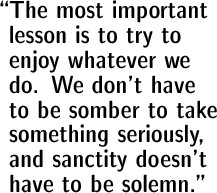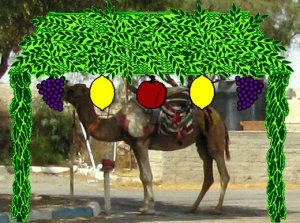Sanctity Doesn’t Have to be Solemn
This is our “holiday season”: Rosh Hashanah (at least one day, two for many), then Yom Kippur (never more than one day), Sukkot (about a week), and finally Simchat Torah and Shmini Atzeret.
It’s these last two that cause confusion.Simchat Torah, literally, “The Joy of Torah,” is either the 8th day of the seven-day holiday of Sukkot (if you keep only one day of Rosh Hashanah) or the 9th day of the eight-day holiday of Sukkot (if you keep two).
Shmini Atzeret, literally, “the eighth, a convocation,” is always the 8th day of Sukkot, whether or not Sukkot has eight days or only seven. (It also gives us the chance to use the word “convocation,” which doesn’t otherwise pop up too frequently.)
 Generally the first and last days of a holiday are “yontiv,” days on which, more or less like Shabbat, we rest from work. So the first and last days of the seven-day holiday of Passover are both yontiv, or, if you keep eight days, the first two days and the last two days. Similarly, the first day of the seven-day holiday of Sukkot — or the first two days of the eight-day holiday of Sukkot — are yontiv, along with the last day or so.
Generally the first and last days of a holiday are “yontiv,” days on which, more or less like Shabbat, we rest from work. So the first and last days of the seven-day holiday of Passover are both yontiv, or, if you keep eight days, the first two days and the last two days. Similarly, the first day of the seven-day holiday of Sukkot — or the first two days of the eight-day holiday of Sukkot — are yontiv, along with the last day or so.
This background is important for understanding a discussion in the Talmud, that ancient compendium of Jewish law that examines and directs Jewish practice. For example it’s the Talmud that tells us when and how to light Hanukkah candles (put them in the menorah from right to left, light them left to right), how often to pray (thrice daily, unless you don’t feel like it), when one bird is similar enough to a kosher bird that it, too, counts as kosher (if they naturally interbreed or if their eggs are indistinguishable), which activities detract from rest on Shabbat and yontiv (travel, for instance), and, of course much more.
So it should come as no surprise that the Talmud gives us regulations regarding the Sukkah: It must have four, three, or two and half walls; must offer a view of the stars; must have more shade than sun; must be at least ten hand-breadths high, but less than about 10 yards; and so on.
Then the question arises (on page 23a of the section called “Sukkot,” if you want to follow along at home) of whether a Sukkah can be built on top of a camel. And the answer is, no, because the Sukkah is meant for the entire seven- or eight-day period of Sukkot, but sitting on a camel counts as travel, which, as we just saw, detracts from yontiv. So a Sukkah on a camel would be useless for at least two of the seven days of Sukkot (or four of the eight).
The next question is whether an elephant can be used for one of the walls of the Sukkah. And, again, the answer is no, because it might run away, invalidating the Sukkah. What about a dead elephant? Sure! As long as the elephant is as least ten hand-breadths in height, we’re good to go. Smaller animals, of course, might be ten hand-breadths in height only when standing but not when lying down. These, according to the Talmud, should therefore be suspended by ropes from above. (Please don’t try this at home.)
Now, Rabbis Meir, Yehudah, and Zeira, along with the other participants of this Talmudic debate, knew full well that hanging an animal just so it couldn’t lie down was a violation of the prohibition against cruelty to animals, and other obvious considerations prevent beasts of burden from doing double duty as structural supports.
So what are we to make of all of this? To me, the most important lesson is to try to enjoy whatever we do. We don’t have to be somber to take something seriously, and sanctity doesn’t have to be solemn. Torah is joyous.
And we have a holiday just to remind us. Happy Simchat Torah.




